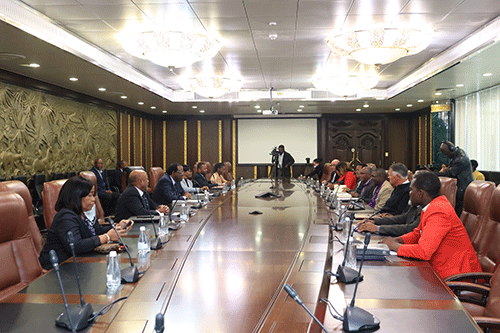Namibia’s housing interventions should focus on the neglected lower end of the market that makes up almost 90% of households nationally.
Phillip Luhl, a member of the task team for the review and development of Namibia’s National Housing Policy (NHP), said this during the stakeholders’ consultative workshop for the revision of the draft National Housing Policy for 2022 and the development of the national strategy for informal settlement upgrading in Windhoek on Wednesday.
The main responsibility of the task team is to propose a comprehensive and more responsive NHP (including an implementation plan).
Luhl advised stakeholders to reach the priority target groups (ultra-low and low-income households) that make up about 88% of households nationally and the policy must focus on participatory informal settlement upgrading to ensure tenure security and provision of basic services.
“The provision of basic serviced land through incremental greenfield developments, provides security of tenure and allows easier future upgrading to formalised neighbourhoods,” said Luhl.
He said the unlocking of underutilised land should guide State intervention towards adequate housing in the long term (leading up to 2030), as the policy envisions an equitable and transparent urban land and housing subsidy/grant system.
Luhl said the task team’s specific actions include developing a project charter which will outline all the activities that need to be undertaken to develop the policy and implementation plan.
Another task was to review all existing studies, policies, programmes and projects, identify gaps and propose a comprehensive housing policy and an implementation plan that will bring about an accelerated delivery of affordable housing in the country and submit a draft NHP and an implementation
plan.
According to Luhl, the Namibian housing crisis is characterised by high housing costs due to slow and costly delivery of serviced land and negligible affordable formal housing production, in a context of high un- and underemployment, and extremely low levels of household income. “Hence, the current revision of the NHP was necessitated by shifting policy direction in the urban land and housing sector, the economic situation requiring larger policy impact with reduced capital outlay, and the need to scale up land and housing delivery, amongst others,” he said.
While officially opening the two-day workshop, urban and rural development minister, Erastus Uutoni urged stakeholders to give critical input on the draft policy by collectively setting ambitious realistic implementation targets that reflect the respective capacities and commitments to accelerate urban land and housing delivery for the majority of Namibians.
“We are beginning with the alignment of the national informal settlement upgrading strategy to the revised NHP during this workshop, as this represents one of the core focus areas of the housing policy to improve living conditions for the majority of residents in the short to medium-term. After that, we look forward to the alignment of the impending policy on urban land reform that will address matters of redistribution and tenure security, urban densification and combating sprawl, intensifying localised urban economies, among many others,” he explained.
He said the workshop must also align the upcoming revision of the decentralisation policy that structures the relationship between central and local government and the upcoming national spatial development framework that will guide spatial development strategically at the national territorial level to achieve common development goals.
“In the long term, the ideal might be to have one predominant policy that covers all relevant aspects and combines them into a unified and sustainable approach towards urban development. Once we have such a common unitary policy direction, we can develop different strategies related to spatial development, urban land, housing, governance and rural development to provide a specific focus for these important sectors,” he said.
The workshop was attended by officials from the lands ministry, regional and local councils, Shack Dwellers Federation and the minister of finance.
– ljason@nepc.com.na



